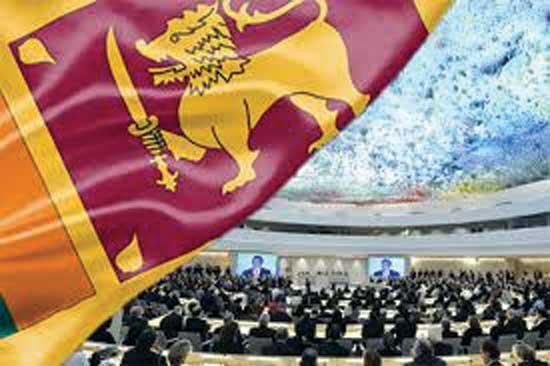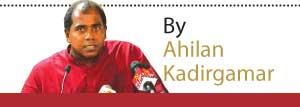Recurrence and Democracy
1 March 2021 04:10 am Views - 829
Sri Lanka is again being raised at the UN Human Rights Council. The moves at the UNHRC are as much the play
In thinking about a plural and democratic future, I start from a different vantage point, from the long arc of our post-Independence history. How do we analyse the many anti-democratic and dangerous moves of the regimes in power and the political elite? And how has democracy survived and who has guarded it during crucial moments in our history?
I argue that it is time and again the working people that have safeguarded democracy in Sri Lanka. Furthermore, international engagement with Sri Lanka has rarely reversed the path of deterioration, even if at times it has provided some breathing space of dissent.
Rationale for militarisation

The Tamil community has been so badly battered by the civil war that armed insurrection is not a possibility. The demographic changes with mass migration to the West, and the social and economic challenges of the war survivors, have sealed the fate of the Tamils as a community on the margins in Sri Lanka. The grand rhetoric of the narrow Tamil nationalists within the country and for that matter the virulent Tamil nationalists in the Diaspora will remain just rhetoric, but it does the disservice of stimulating Sinhala Buddhist chauvinism. While the Tamil youth can be distracted by such emotive discourse, wasting their youthful energy and not contributing to rebuilding their society, there will be no mass armed movement.
As for the Easter Sunday Attacks, I see that as an aberration by a fringe Muslim group with suicidal politics. It was a tremendously horrible and devastating spectacle, but it ended there. The Muslim community is under severe attack, but there are no signs of a broader ethno-religious movement seeking separatist ends as was characteristic of the Tamil community in the 1970s.
"The demographic changes with mass migration to the West, and the social and economic challenges of the war survivors, have sealed the fate of the Tamils as a community on the margins in Sri Lanka"
These points are important here because the rationale for international mechanisms of accountability and calls to address impunity, are often linked to the possible recurrence of armed conflict. Rather, I claim the discourse of recurrence of armed conflictonly becomes a rationale for intensifying militarisation and the consolidation of the security establishment. Furthermore, such militarisation only leads to greater repression undermining democratic freedoms. There are grounds for accountability and the need to address impunity from calls for justice, but it does not work for the reductive idea of non-recurrence of armed conflict; neither for Sri Lanka nor for most places where there have been armed conflicts.
History is far more complex than to repeat itself with cause and effect, and what I worry for our future is the
Struggles for change
From the disenfranchisement of the Up-Country Tamils soon after Independence in 1948, the despicable exclusions of ‘Sinhala Only policies’ in 1956, the periodic horrific ethnic pogroms, the inability to learn about youth disaffection from the JVP insurrections of 1971 and 1988, the abominable descent into a civil war with the arrogance of armed powers on both sides, to the failure to reconcile with the major post-war opportunity—Sri Lanka’s political elite have been replete with failures. These moments of exclusion, repression and mass violence have also drastically shaped the thinking of working people with backward ideologies of nationalist chauvinism. Such chauvinist ideologies have pitched peoples against each other, surrendering peoples’ power to political leaders who have only denied the citizenry’s aspirations.
"One must not forget the inspiring historic moments such as in 1994 and 2015, when the UNP regime and then the SLFP regime were overthrown by working people from all communities. Those were regimes just a few years earlier seemed invincible"
In this context, one must not forget the inspiring historic moments such as in 1994 and 2015, when the UNP regime and then the SLFP regime were overthrown by working people from all communities. Those were regimes just a few years earlier seemed invincible. However, when their social and economic future was in peril,the democratic ethos of the masses of working people sparked the change, and they came together across the ethnic and religious divides.
I confess to placing some confidence in the recurrence of such democratic changes, yet I also know there is no assurance or inevitability of democratic longevity. The rise of fascism, and the shutting down of all space for peoples’ struggles, could put an end to such democratic changes. The point here is that political changes grounded in the working people are dependent on struggles. The Great Hartal of 1953, the farmers’ movements in the early 1990s and the range protests including the FUTA-lededucation mobilisation in the years leading up to 2015, galvanised democratic regime change.
Returning to our current moment of the UNHRC, the Government is responsible for having led the path to putting Sri Lanka on the dock. Its arrogance and oppression of people domestically as well as its inability to recognise its fragile international standing could well lead to its international isolation resulting in the further aggravation of economic pressures. However, such international isolation will not serve the future of our people. It is again the struggles of the working people arising out of their everyday realities – albeit with the added concerns of the working people from minority communities who face the double squeeze of economic and chauvinist attacks – that may set us back on the path of democracy. Are we deafened by the clamour of UNHRC, or are we listening to the struggles of the working people in these times of great social and economic turmoil?